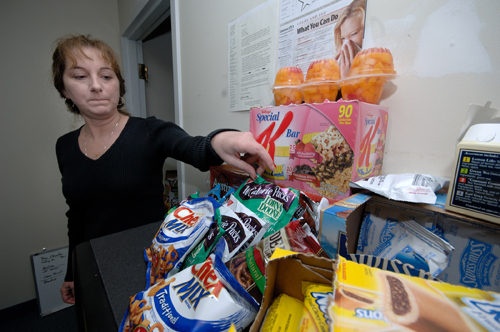
One day last year, Don Nokes threw away the Reese’s Peanut Butter Cups, Mountain Dew and other junk food that his employees used to fuel their late-afternoon work and replaced them with flavored water, fruit cups and other healthy snacks.
Nokes, the president of NetCenergy, a Warwick-based, computer-networking company, is among a growing number of small business owners now promoting healthy living in the workplace in the hopes of controlling ballooning health-insurance costs.
The amount of money that NetCenergy contributes to its employees’ health-insurance policies has risen about 37 percent in four years, becoming the company’s second biggest cost of doing business, Nokes said.
“It’s going to get to the point where the extent of my health-insurance coverage will be being able to put some Band-Aids in with their paychecks,” he said. “We see our employees 250 days a year. We have an opportunity to help them with a healthier lifestyle.”
The rapid, unchecked rise in health-insurance costs for both employers and workers is being driven in part by increased rates of heart disease, diabetes, emphysema and other diseases related to obesity, smoking and other unhealthy lifestyles, according to health care experts.
Twenty years ago, the United States spent $3 billion for obesity-related illnesses. In 2004, the country spent $36 billion to fight obesity-related illnesses, Nokes said.
Nokes serves on several business and government task forces aimed at lowering health- insurance costs, including the state’s WellCare Advisory Committee, which in October unveiled a new type of insurance plan available from both Blue Cross & Blue Shield of Rhode Island and UnitedHealthcare of New England.
The HealthPact plan, which lowers annual insurance premiums by about 20 percent for employees who commit to working with a primary-care physician to quit smoking, lose excess weight or in other ways live healthy lifestyles, involves the consumer in lowering health care costs, Nokes said.
Nokes first effort to make NetCenergy a healthier company occurred in 2005, when he launched a team incentive program aimed at getting the company’s four smokers to quit. Three of the four successfully quit smoking and are still nonsmokers today, he said.
Last year he went a step further, replacing the free potato chips, chocolate bars, soda and other snacks that NetCenergy provided to its employees with the healthier snack options.
“I looked around and I thought, ‘What kind of message am I sending to my employees about healthy living?’” Nokes said. “So we threw it all out. …We now have fruit cups and low-calorie snacks and low-fat snacks that are available to anyone who might want to have a snack throughout the day. And we provide that for free, as we did before.”
In 2008, NetCenergy is working toward winning a “Well Workplace” designation from the Wellness Councils of America, a national coalition aimed at advancing results-oriented wellness programs in the workplace.
NetCenergy will also participate in the 2008 edition of Shape Up Rhode Island, the statewide wellness program that has teams of people compete to collectively lose the most weight and exercise the most.
“[Wellness] became a very big issue for everyone, especially small businesses,” Nokes said. ·










